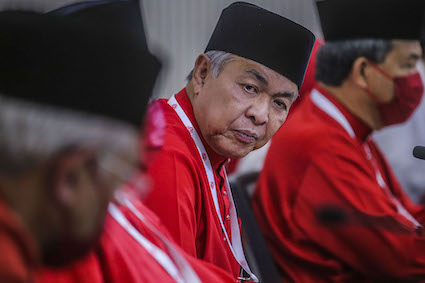Three things we learned from: Umno’s 75th AGM

(MMO) – Umno held its second annual general assembly since losing its place as Malaysia’s premier political party over the weekend, amid talks of division within its ranks and questions about its future.
Observers predicted that the 75th assembly, meant to be held last year but delayed by the Covid-19 pandemic, would be one of bloodletting between three squabbling factions.
One side favours remaining in Perikatan Nasional and then there are those who do not. The third appears less interested in this for or against schism and is instead pushing for a leadership overhaul, according to some party insiders. This faction, however, is smaller in number.
How did the leadership respond? The tone adopted by Umno president Datuk Seri Ahmad Zahid Hamidi in his policy speech provided some clues.
Here are three main takeouts from the party’s 75th AGM.
1. It’s clear, Umno will not work with Perikatan Nasional, Bersatu or Pakatan Harapan
Ahmad Zahid, despite initially hinting at the unprecedented possibility of collaborating with Pakatan Harapan, made it clear in his policy speech that his party rejects in total the idea of working with any of the three-member Opposition coalition.
There are murmurs that Ahmad Zahid may have made the assertion to placate grassroots growingly unnerved by the rumour, but it is something hard to verify.
But from the signal delegates sent out when debating Ahmad Zahid’s policy speech, it was clear that the majority, if not all, party grassroots believe Umno is still the juggernaut it was before its ouster in the 14th general election, and that it should not be in the position to compromise.
This was evident in the top-down display of enmity towards Parti Pribumi Bersatu Malaysia, the breakaway party led by Prime Minister Tan Sri Muhyiddin Yassin, a former Umno deputy president.
Ahmad Zahid himself spelled it out that the party will not cooperate with the splinter group, whose leaders were derided with some of the harshest words like “apek lempang”, a derogatory term referring to parasite or parasitic behaviour.
This same enmity appeared to have been directed towards party leaders or members that are either supportive or Bersatu or sympathetic to the PN. Most Umno delegates saw Bersatu as “leeches”, pretenders who only sought Umno’s hands to remain in power.
2. Not all of Umno view PAS as friends
If it was vague then it’s much murkier now. Umno, or at least many of its leaders, appeared to have issued an ultimatum to PAS: either you are with us or against us.
This position has left Ahmad Zahid and the pro-PAS faction somewhat more isolated. The Umno president was the key power broker who played a crucial role in the Umno-PAS alignment, which later led to the formalisation of Muafakat Nasional.
Analysts said the super Malay electoral pact could guarantee the two parties up to 75 per cent of the ethnic Malay votes, effectively guaranteeing them victory should national elections be held now.
But all that is now up in the air. If the messages of the debates were anything to go by, Umno leaders implicitly expressed their willingness to relinquish this advantage, likely on the back of confidence that their party, given the Malays were forced to choose, is still very much the best out of the two.
Umno has the largest share of parliamentary seats comparatively, but pundits have discounted any possibility of the party forming a government on its own at the 15th general election, which meant it would still need to forge alliances with others.
Ahmad Zahid told delegates at the 75th AGM here that Umno will contest the upcoming general election solely under the Barisan Nasional (BN) coalition banner, but said it is open to negotiations to form a coalition government once the elections are concluded.
There are views within the party that Umno would increase its share of seats and would be in a more power position to dictate the terms if any negotiations are to take place.
Umno’s Barisan Nasional coalition partners, the MCA and MIC, share just three seats between them.
3. Umno yet to learn from GE14 defeat, believes power is a given
The party is in war mode. Umno wants to tell rivals that it would march into the electoral battlegrounds prepared and is confident of winning.
But much of that confidence is rhetoric.
Throughout the two-day assembly, few delegates made an effort to show a watchful public that Umno has repented, or at least is a party attempting to reform and purge itself of the very elements that led to its humiliating loss in the 14th general election.
Instead, leaders used the meeting as yet another rival-bashing binge, indulging in self-elevating sentiments that mostly centred around belittling Bersatu, which could suggest to observers that Umno actually viewed the splinter party as a threat despite all the attempts to paint their sister outfit otherwise.
Policy discussions were virtually absent during the debates.
Bar the warning issued by Umno Youth vice chief Shahril Hamdan, who said the party must present radical solutions to solve urgent issues like stagnant wages or underemployment, others left little impression on the policy front.
Next to the party’s obsession with Bersatu was its penchant for basking in the past, often gloating about its former strength and talking of ruling without actually offering anything concrete to voters who now have come to associate Umno with corruption and excess.
In his policy speech, Ahmad Zahid claimed it was his party that pressured the PN government to roll out some of the key relief Covid-19 measures, among them, the loan moratorium extension and loosening requirements for pension withdrawals.
But there was little follow-through from that. The topic, which would have been conventionally compulsory to debate, eluded much of today’s session because from the very get go itself, party leaders appeared only interested in discussing power.

